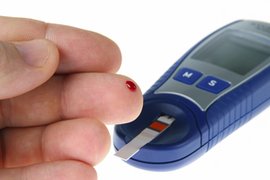Diabetes affects over 23 million people in the United States and is the 7th leading cause of death. Uncontrolled high levels of blood sugar can cause vascular damage to the retina of the eye, the filtering system of the kidney, and the peripheral nerves. In fact, diabetes is the leading cause of adult blindness, kidney failure, and non-traumatic amputations in the United States. Failure by a health care provider to diagnose, treat, and educate diabetic patients may constitute medical malpractice should a serious injury occur. Preventative measures such as annual dilated pupil exams, annual foot exams, and prescription  medications to control high blood pressure can greatly reduce the risk of injury to the diabetic patient. Outpatient laser treatment to seal off abnormal blood vessels in the retina may significantly delay or prevent the onset of symptomatic diabetic retinopathy and blindness. ACE inhibitors are drugs that can lower blood pressure and prevent damage to the filtering system of the kidney. Effective patient education (by a diabetic educator) about the importance of a maintaining a healthy diet, daily exercise, and proper hygiene are essential to help prevent diabetic complications.
medications to control high blood pressure can greatly reduce the risk of injury to the diabetic patient. Outpatient laser treatment to seal off abnormal blood vessels in the retina may significantly delay or prevent the onset of symptomatic diabetic retinopathy and blindness. ACE inhibitors are drugs that can lower blood pressure and prevent damage to the filtering system of the kidney. Effective patient education (by a diabetic educator) about the importance of a maintaining a healthy diet, daily exercise, and proper hygiene are essential to help prevent diabetic complications.
Diabetes may arise for the first time during pregnancy and cause serious complications. This type of diabetes is referred to as gestational diabetes and can cause the fetus to become oversized and fat due to the excess glucose in the umbilical blood. Unfortunately, an oversized fetus may render a vaginal delivery high risk as birth injuries such as shoulder dystocia are more likely to occur. Failure to diagnose and treat gestational diabetes may result in life threatening complications to the fetus and the mother and may give rise to a medical malpractice claim.
On the flip side, low blood sugar can cause hypoglycemic episodes that may result in brain damage or death. Over administration of insulin, or a failure to monitor low blood sugar levels in diabetic patients may constitute medical malpractice. Reduced blood sugar levels (blood glucose below 65mg/dL) may result in neurogylopenic effects such as impaired judgment, dizziness, slurred speech, seizures, and coma. In a hospital or nursing home setting, glucose fingerstick testing may be necessary every few hours to prevent a serious hypoglycemic episode from arising.
